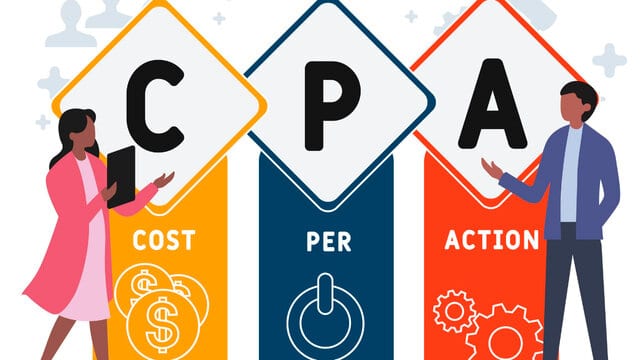If you’re reading this post right now, you’re wondering what CPA affiliate marketing is all about and how you can make money from it.
CPA marketing is another form of affiliate marketing where marketers like you get paid when a visitor takes action on a company’s website.
For instance, if Beatrice has thousands of Instagram followers, who are interested in dating and relationships.
And when she joins one of the CPA affiliate networks for free, she can promote offers that allow people who are interested in dating to sign up for a free dating site.
With this, Beatrice will get paid for every visitor that will sign up with their email address. CPA marketing is a twist on affiliate marketing. With CPA, you will still make money even when a visitor makes a purchase or not.
However, with affiliate marketing, you need to get a visitor or customer to buy an affiliate product before making a commission, but not so with CPA marketing.
Although it is the simplest type of affiliate marketing, it still has some pros and cons, which you will get to know all in this post.
Most people get confused with CPA marketing and affiliate marketing. And if you’re of them, don’t worry. I got you covered in this post.
By the time you finish reading this free guide, you’ll get to know the difference between CPA marketing and affiliate marketing, how you can make money from it, and examples of CPA marketing you can join as a beginner.
Let’s get started!
What Is CPA Affiliate Marketing?

CPA marketing is an affiliate marketing strategy where advertisers reward publishers (Bloggers, YouTubers, etc.) and affiliate marketers when their referrer completes a specific task or action.
Or let me break it down in this way. CPA marketing means Cost Per Action marketing.
It is a type of affiliate marketing model that allows publishers such as YouTubers, Bloggers, influencers, or marketers to earn commissions when their visitors perform an action or complete a task on a company’s website.
I hope you’re getting the concept?
CPA affiliate networks reward marketers when they refer leads or customers to perform any actions such as:
- Signing up for a newsletter.
- Sending visitors to participate in online surveys.
- Getting people to download software, testing mobile applications, and downloading games.
- Email sign up.
CPA Marketing Vs. Affiliate Marketing?
| CPA Marketing | Affiliate Marketing |
| You get paid when a visitor completes a simple task | You get paid when a visitor makes a purchase |
| No credit card is required from a visitor | A credit card is involved to buy an affiliate product |
| Low payout rate | High payout rate |
| You need to get approved by the CPA network | Easy and Fast to get your affiliate links after signing up for affiliate networks like ClickBank |
| You get paid fast | Payment depends on your advertising channel. |
Can You Make Money From CPA Affiliate Marketing?

You can make good money from CPA affiliate marketing. It is one of the simple affiliate marketing strategies to make money online.
Unlike affiliate marketing, where you get a visitor to convert or make a purchase before you get paid, CPA allows you to earn a commission when even your visitor doesn’t buy a product.
With CPA marketing, you can choose how you want to promote your offers.
You can promote offers in either Cost Per Lead (CPL), which means when a visitor provides his or her email address in a signup form, or promotes offers in CPS ( Cost Per Sale) when a visitor makes a sale.
There are so many people making millions from CPA affiliate marketing. It is the easiest way to make money online if you have the right audience interested in your niche and enroll in the right CPA marketing course.
CPA Affiliate Marketing Terminologies

1. Category: The niche for which the CPA offers are found(e.g., Offers in sports, fashion, beauty, health, etc.).
2. Offer page: The webpage where the conversion occurs after a visitor takes the necessary action.
3. Affiliate Manager: A person who manages an affiliate program for a merchant. They are responsible for recruiting, engaging with affiliates, and generating revenue for the merchant.
4. Commission: The payment you get when you promote an offer.
5. Cost per action (CPA): An online advertising strategy that allows an advertiser to pay for a target customer’s specified action.
6. Earnings per click (EPC): The average amount an affiliate earns every time a user clicks an affiliate link.
7. Conversion rate: The percentage rate at which a particular action is performed. In other words, the number of successful conversions is divided by the total traffic.
8. Cookies: In affiliate marketing, cookies are used to assign a unique ID to a user who has clicked the affiliate link to an advertiser’s site for a specific duration.
9. Contextual link: A text link placed within an affiliate website links to the advertiser’s website.
10. Advertiser: Advertisers are the people who pay CPA networks to get conversion of their offers.
11. Publishers: People like you and me who are promoting the CPA network’s offers to make money.
Examples Of CPA Affiliate Networks
- MaxBounty
- PerformCb
- AdWorkMedia
- PeerFly
- CPALead
